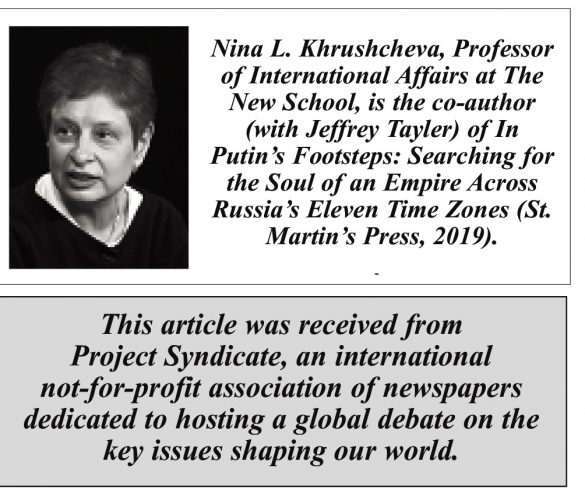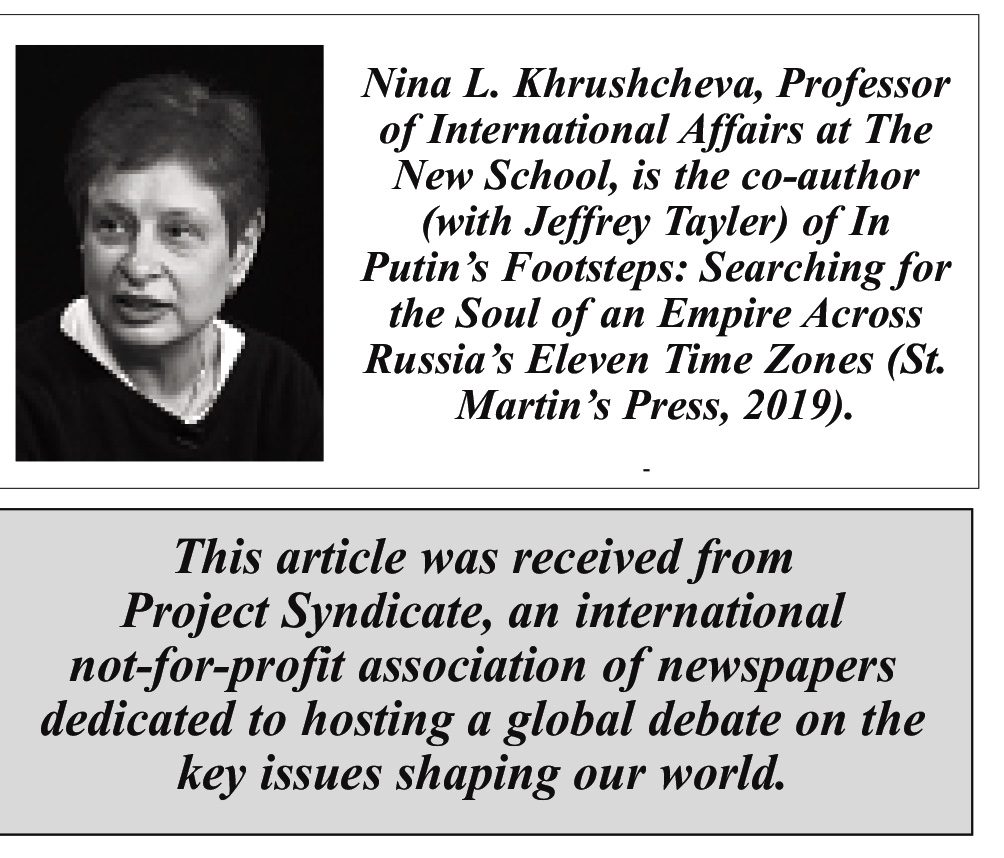 Project Syndicate: As the Ukraine war hit the two-year mark, and following Russian opposition leader Alexei Navalny’s death in prison, the United States and the European Union have piled new sanctions onto Russia. But with Vladimir Putin preparing Russians for “permanent war,” can sanctions deter him? Will the West’s reaction to Navalny’s death affect next week’s presidential election in any meaningful way?
Project Syndicate: As the Ukraine war hit the two-year mark, and following Russian opposition leader Alexei Navalny’s death in prison, the United States and the European Union have piled new sanctions onto Russia. But with Vladimir Putin preparing Russians for “permanent war,” can sanctions deter him? Will the West’s reaction to Navalny’s death affect next week’s presidential election in any meaningful way?
NLK: As troubled as many Russians are by Navalny’s death, it has so far not galvanized any notable popular response. While it could yet trigger some unrest – such events can be difficult to predict, especially in Russia – there is little reason to believe that the upcoming “elections” (if you can even call them that at this point) will be disrupted. If the threat of harsh punishment in Putin’s Stalinesque state is not enough to deter any agitation, the security forces – which will be deployed in huge numbers around voting time – will swiftly quell it. Whatever the details of the journey, the destination is the same: more President Putin.
As for sanctions, the West’s focus on them has always been misguided. They were not going to deter him when he launched the full-scale invasion of Ukraine two years ago, and they will not deter him now. Sanctions might even strengthen Putin’s position at home: because sanctions do far more harm to ordinary Russians than to those in the Kremlin, they can be used to reinforce Putin’s narrative that the West is at war against Russia and will go to extreme lengths to destroy it.
PS: With Western aid to Ukraine drying up, calls to seize the $300 billion in Russian central-bank assets that Western governments froze after the invasion are growing louder. At a time when “realistic talks with the Kremlin” might be the best hope of ending the war, would seizing Russia’s assets give the West more leverage or less?
NLK: Leverage is not the point. International rules and norms are.
Two years into the war, Russia’s central-bank assets have not been seized, because the West recognizes that doing so would not be fully legal and would contradict the norms to which it claims to adhere. The West’s international reputation could thus suffer considerably.
This is something the West can ill afford. Russia’s success in weathering harsh sanctions, including the freezing of its central-bank assets, has already amounted to something of a humiliation for the US and its partners. But it is Western hypocrisy that may have done the most harm to these countries’ reputation, particularly in the Global South.
Western companies have complained about being mistreated in Russia, even as their governments freeze Russian assets and heap sanctions onto the country. And Western leaders have criticized Russia for acting exactly as they have: for example, European Commission President Ursula von der Leyen last year condemned Putin’s use of energy “as a weapon,” though the EU had already done just that. “She uses Russia’s entire economy as a weapon,” noted one Indian journalist in response to her comments. That same journalist then asked me: “How can the West possibly expect Russia to follow rules when the West has freely broken them in its quest to punish Russia?”
If the West seizes Russian assets, it is effectively declaring that it does not consider Russia to be a place that warrants adherence to international law and business norms. In the long run, that will undermine the West more than it will undermine Putin.
PS: After the late Wagner Group leader Yevgeny Prigozhin’s aborted rebellion last summer, you wrote that “Putin’s weakness – and the cracks in the system he so meticulously built – are unmistakable.” More recently, you compared Russian propaganda to Potemkin villages – “a façade behind which lie sham elections, a weakening economy, and proliferating violence.” How serious is the threat that these vulnerabilities pose to the Putin regime’s survival, and where might the façade begin to collapse?
NLK: The cracks are everywhere. We saw them when anti-Ukraine war politician Boris Nadezhdin gathered more than 200,000 signatures in support of his presidential candidacy (he has since been barred from running). We saw them when thousands of people laid flowers at memorials for victims of political repression after Navalny’s death, even though hundreds were detained. We saw them at Navalny’s funeral – at both the church service and the cemetery – which was attended by tens of thousands of people chanting not only his name, but also “Putin is a murderer” and “no to war.” This resulted in some detentions, though the authorities refrained from a harsh crackdown.
Despite the risks, it seems that Russians can still occasionally get away with speaking out, at least for now. After Diana Arbenina and her rock band, the Night Snipers, had their concerts canceled in some cities over their criticism of the war, Arbenina spoke out, telling an audience in Chelyabinsk that, though she had been warned to stay silent about the “lawless” bans, she would not obey – and her fans should not obey, either. The crowd cheered, and the show continued; the police did not dare intervene.
None of this is to say that a revolution is imminent (though it might be). But the longer the war drags on, the more difficult it will become to keep an increasingly restive people in check. Even if the economy holds, the sheer scale of repression has turned Russia into a kind of pressure cooker. The risk of an explosion is growing.
A recent Proekt media investigation calculated that since 2018, when Putin’s current term began, almost 6,000 criminal cases against Russian citizens qualify as political repression. For comparison, in 1956-85 – from the post-Stalin years to the beginning of Mikhail Gorbachev’s glasnost and perestroika – there were about 8,000 in total. The harder the Kremlin tries to stave off rebellion, the more likely rebellion becomes.
By the Way…
PS: Yulia Nalvanaya, Alexei Navalny’s widow, largely avoided the limelight while her husband was alive, but now says she will step into public life to uphold his legacy of anti-Putin activism. How effective can she be in the crucible of repression that Russia has become?
NLK: Navalnaya seems to be an admirable person. Perhaps she will succeed. But she is not in Russia. This is understandable: Moscow is not safe for Navalnaya. It was not safe for her late husband, either, but he returned there anyway in 2021, after recovering from an attempted assassination by poisoning with the nerve agent Novichok. He knew that opposition from outside Russia can have very limited results; a politician must be in the country of his politics.
While Navalnaya speaks about Navalny’s death at events abroad, his mother Lyudmila in Siberia tried to get his body released for burial. Though many Russians understand Navalnaya’s choice to stay away, the contrast between Navalny’s formidable mother – “she must be where her son got his grit,” they say – and his limelight-seeking widow has not gone unnoticed.
Spending time talking to foreign leaders about Russia’s problems has little impact inside the country, as Gary Kasparov and Mikhail Khodorkovsky have shown. Unless Navalnaya returns to Russia, I don’t see how politically effective she could be.
PS: Are fears that Putin plans to invade NATO countries next – possibly starting with the Baltics – justified, overblown, or something else?
NLK: I find this rhetoric utterly irresponsible. NATO countries are understandably upset that Ukraine’s summer 2023 counteroffensive failed to meet their (unrealistically high) expectations. They now worry that they cannot sustain the massive flows of funding and aid that they have been delivering for the last two years. Domestic political resistance is intensifying. So, leaders are attempting to scare people into action by warning that, if Putin achieves a victory in Ukraine, NATO will be next.
This rhetorical escalation could make military escalation more likely. Putin has not shown any desire to wage war on NATO. But, by stoking fear that he would, NATO leaders risk creating a kind of self-fulfilling prophecy. Even I – a consistent critic of Putin – find this thoroughly provocative and foolish.
Copyright: Project Syndicate, 2024.




